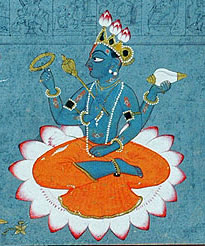HARE KRISHNA MANTRA
ABOUT PAINTINGCloseup of Vishnu, seated in the lotus position on a lotus. From depiction of the poet Jayadeva bowing to Vishnu, Gouache on paperPahari,
The very picture of devotion, bare-bodied, head bowed, legs crossed and hands folded, Jayadeva stands at left, with the implements of worship placed before the lotus-seat of Vishnu who sits there, blessing the poet.Datedated 1730 A. D.SourceThe Government Museum and Art Gallery, Chandigarh,AuthorUnknown |
Beatles influenceAfter coming in contact with the Hare Krishnas in 1969, several of the Beatles took an interest in the movement.[1] This interest is reflected in songs recorded by the band and its members.
Early devotees included John Joseph and Harley Flanagan of the band Cro-Mags, Ray Cappo of Youth of Today, and Vic DiCara, former guitarist for Los Angeles band Inside Out, who established quite possibly the most famous of all of the newly dubbed bands, namely108.[9][10] Krishnacore bands sing about Krishna and Krishna Consciousness the same way that a Christian band would sing about Jesus. Other notable Hare Krishna punk and hardcore musicians include: Shelter, Cro-Mags, Run Devil Run, Request Denied, Poly Styrene andLora Logic of X-Ray Spex. [edit] |

